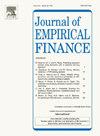Creating value through corporate social responsibility: The role of foreign institutional investors in Chinese listed firms
IF 2.4
2区 经济学
Q2 BUSINESS, FINANCE
引用次数: 0
Abstract
This study examines the interplay between two major global trends—the growing role of foreign institutional ownership (FIO) due to financial liberalization and the rise of corporate social responsibility (CSR) as an investment ethos. We choose the setting of China, the world’s second-largest economy that has recently experienced substantial growth in foreign portfolio investment and increased its commitment to CSR. We document that CSR performance significantly influences the portfolio allocation decisions of certain types of FIO. Crucially, our analysis reveals that firms with a higher level of ownership by foreign institutional investors are associated with a more positive relation between CSR performance and firm value. This finding is robust to endogeneity examinations, including quasi-natural experiments and instrumental variable estimations. The finding is stronger for non-state-owned enterprises, firms with higher customer awareness, firms with more foreign directors, and firms with more frequent corporate site visits from FIO. Monitoring and advising are two likely channels through which FIO enhance the CSR-value relation. Finally, we demonstrate that FIO enhance firms’ ability to harness the power of CSR as a driver of innovation.
通过企业社会责任创造价值:境外机构投资者在中国上市公司中的作用
本研究考察了两种主要全球趋势之间的相互作用——由于金融自由化,外资机构所有权(FIO)的作用日益增强,以及企业社会责任(CSR)作为一种投资精神的兴起。我们选择的背景是中国,这个世界第二大经济体最近经历了海外证券投资的大幅增长,并加大了对企业社会责任的承诺。我们证明了企业社会责任绩效显著影响某些类型的投资组合配置决策。至关重要的是,我们的分析显示,外国机构投资者持股水平越高的公司,其社会责任绩效与公司价值之间的关系越积极。这一发现是稳健的内生性检查,包括准自然实验和工具变量估计。这一发现在非国有企业、客户认知度较高的企业、拥有更多外国董事的企业以及FIO更频繁访问企业的企业中更为明显。监测和建议是FIO加强企业社会责任与价值关系的两个可能渠道。最后,我们证明了企业自主创新增强了企业利用企业社会责任作为创新驱动力的能力。
本文章由计算机程序翻译,如有差异,请以英文原文为准。
求助全文
约1分钟内获得全文
求助全文
来源期刊

Journal of Empirical Finance
Multiple-
CiteScore
3.40
自引率
3.80%
发文量
59
期刊介绍:
The Journal of Empirical Finance is a financial economics journal whose aim is to publish high quality articles in empirical finance. Empirical finance is interpreted broadly to include any type of empirical work in financial economics, financial econometrics, and also theoretical work with clear empirical implications, even when there is no empirical analysis. The Journal welcomes articles in all fields of finance, such as asset pricing, corporate finance, financial econometrics, banking, international finance, microstructure, behavioural finance, etc. The Editorial Team is willing to take risks on innovative research, controversial papers, and unusual approaches. We are also particularly interested in work produced by young scholars. The composition of the editorial board reflects such goals.
 求助内容:
求助内容: 应助结果提醒方式:
应助结果提醒方式:


